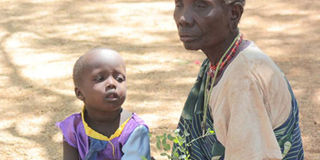Village elder in Baringo bemoans attack on children by bandits

A girl basks in the sun with her grandmother at Eldume IDP camp in Baringo South on March 16, 2017, where they were taken by police after bandits attacked their home. PHOTO | CHEBOITE KIGEN | NATION MEDIA GROUP
What you need to know:
- Two weeks ago, in the aftermath of the deadliest attack so far, the Nation counted nine bodies of victims.
- According the Economic Survey of 2014, taking care of one’s family in the middle of an armed attack is often impossible
For as long as there has been conflict — which is as long as history itself — the warriors of Baringo have never harmed women or children.
An unwritten code dictated that they could kill the herdsmen and steal their livestock, but women and children were sacred. Untouchable.
That, however, has changed, and now this sacred demographic is being used as a war pawn in the dusty plains of Baringo. The elders, naturally, are not amused.
“They used to kill the herdsmen, take their cattle, and leave,” says a man who only identified himself as Sangale, “but now after taking the cattle they ransack homesteads in search of women and children, whom they either kill or maim”.
Sangale, particularly, mourns the children of Baringo whom he says are suffering the consequences of a conflict they least understand.
Children as young as a few days old have become casualties of the bloodbath in Baringo, where the government’s response has been wanting.
Locals say they are shocked by the cruelty of attackers who, in the middle of their murderous charges, have turned against abandoned babies, executing them by the gun.
Among the victims is a six-year-old girl who was flown to Nairobi two weeks ago for specialised care after gunmen attacked her village, shot her in the chest, and hit her on the head with a machete.
She survived the mayhem, but her mother and siblings were not as lucky.
And last Friday mourners gathered at a small village in the fields of this vast, barren land to bury a three-day-old baby who had been shot even before she could be named. Her mother was also killed.
MOTHER KILLED
Two weeks ago, in the aftermath of the deadliest attack so far, the Nation counted nine bodies of victims.
Only one was an adult man. Mary, a mother of five in her late 20s, had watched as the attack in Mukutani unfolded.
A little girl with a bean bag played with her friends as she waited for her mother to prepare a meal, her first of the day.
When the meal was ready, her mother called out to her and her friends, but before they could respond a yelp pierced the air, followed by screams and the unmistakable pop! pop! of a gun.
The girl ran into the family’s mud house where she found her mother lying on the floor and an armed man towering over her.
“Poleni, poleni,” she heard her mother apologise on behalf of her community for any wrongs against the gunman’s people.
Those pleas were silenced by a single gunshot to the head as the six-year-old girl watched.

A resident of Yattya, Baringo North, on March 26, 2017 mourns the death of her kin killed by suspected Pokot raiders. PHOTO | CHEBOITE KIGEN | NATION MEDIA GROUP
It is not clear whether it was the same gunman who shot the young girl in the chest, but hours later rescuers found her cowering inside the small hut, the lifeless body of her mother lying next to her and a bullet lodged in her chest.
At Kabarnet, where we first ran into her, the young girl was still in shock.
Doctors had bandaged her wounded head but could not remove the bullet in her chest.
ESCAPE TIME
We approached her with caution, seeking first to assure her that we meant no harm, and to win her trust, before we encroached onto her space.
But even as we did so, she kept whispering in this haunting, lifeless voice.
“Poleni, poleni,” she repeated the plea her mother had shouted to the gunman inside the hut at Mukutani. “Poleni, poleni.”
Mary, who counts herself lucky to be alive, says children here are often separated from their parents in the helter-skelter to safety.
Considering that, on average, women here bear an average of five children, according the Economic Survey of 2014, taking care of one’s family in the middle of an armed attack is often impossible, and so the young ones are left to their own means.
“When we are attacked it is very difficult to run with all the children, so you grab the tiniest ones and run to safety, in hope that when you come back for the older ones, you will find them alive. We leave them to God,” says Mary.




